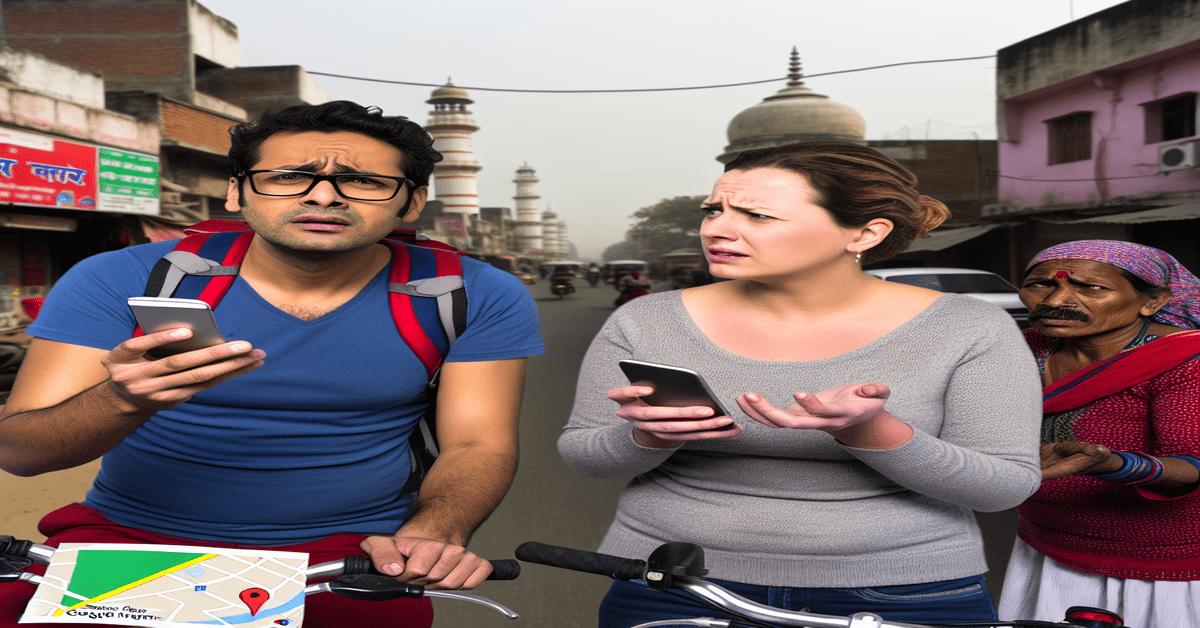Lost in Translation: The Perils of Over-Relying on Google Maps for Navigation
In an age where technology has become an integral part of our daily lives, it’s easy to fall into the trap of over-reliance. We trust our devices to guide us through unfamiliar territories, provide us with instant information, and keep us connected with the world. However, a recent incident involving two French tourists in India serves as a stark reminder that even the most advanced technologies can have their limitations.
The tourists, who were traveling by bicycle through the city of Bareilly in Uttar Pradesh, found themselves in a predicament when they realized they had gotten lost. Despite relying on Google Maps for navigation, the mapping service led them astray, leaving them unable to find their way back to their intended route.
The Limitations of GPS Navigation
This incident highlights a crucial issue that many travelers face when exploring new places: the potential inaccuracies and limitations of GPS navigation systems, particularly in regions with less detailed mapping data. While services like Google Maps have revolutionized the way we navigate, they are not infallible.
In areas where mapping information is incomplete or outdated, relying solely on GPS can lead to confusion and disorientation. This is especially true in developing nations or remote regions where infrastructure and road networks may not be as well-documented as in more developed areas.
The Importance of Local Knowledge
The story of the French tourists getting lost in Bareilly underscores the value of local knowledge and the importance of seeking assistance from residents or authorities when navigating unfamiliar territories. While technology can be a valuable tool, it should not be relied upon as the sole source of guidance.
When traveling to new places, it’s essential to do your research beforehand and familiarize yourself with the area. Cross-check navigation tools with local maps, ask for directions from reliable sources, and be prepared to adapt your plans if necessary. Engaging with locals can provide valuable insights and help you navigate cultural differences that may not be apparent through digital means.
Balancing Technology and Human Interaction
In a world that is increasingly reliant on technology, it’s crucial to strike a balance between digital tools and human interaction. While apps and GPS systems can certainly make our lives easier, they should not replace the value of face-to-face communication and the wisdom that comes from local experience.
When traveling, take the time to connect with people around you. Ask for recommendations, learn about the local customs and culture, and be open to serendipitous encounters. These human connections can often lead to the most memorable and enriching travel experiences.
Lessons Learned for the Future of Navigation
The incident in Bareilly serves as a wake-up call for both travelers and technology companies alike. It highlights the need for continued improvements in mapping data and the importance of providing users with clear disclaimers about the limitations of GPS navigation in certain areas.
As we move forward, it’s essential for tech giants like Google to invest in expanding and refining their mapping capabilities, particularly in regions where data may be lacking. Collaborating with local authorities and communities to gather accurate information can help ensure that travelers have access to reliable navigation tools, no matter where their adventures take them.
Furthermore, this story should encourage travelers to approach navigation with a more balanced perspective. While GPS and mapping apps can be incredibly useful, they should be viewed as complementary tools rather than absolute authorities. By combining technology with local knowledge, human interaction, and a sense of adventure, we can navigate the world with greater confidence and create more meaningful travel experiences.
#GoogleMaps #Navigation #TravelTips
-> Original article and inspiration provided by Times Of India
-> Connect with one of our AI Strategists today at ReviewAgent.ai


